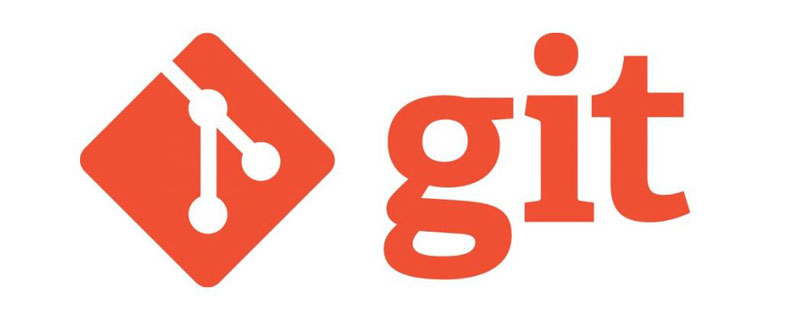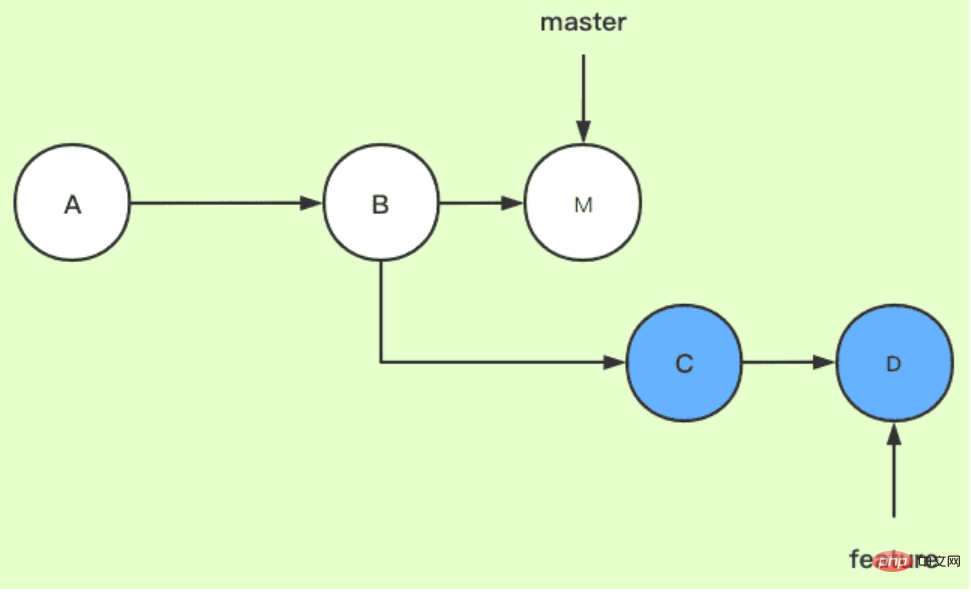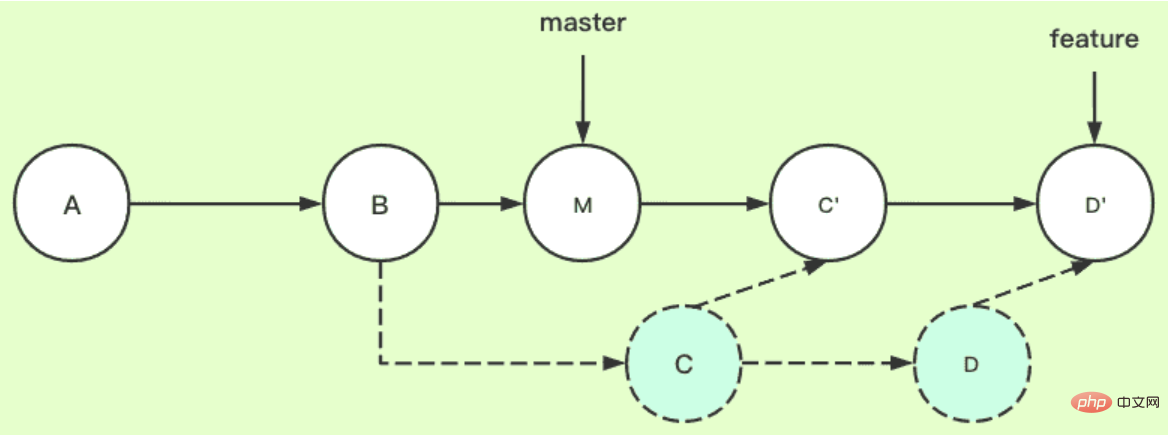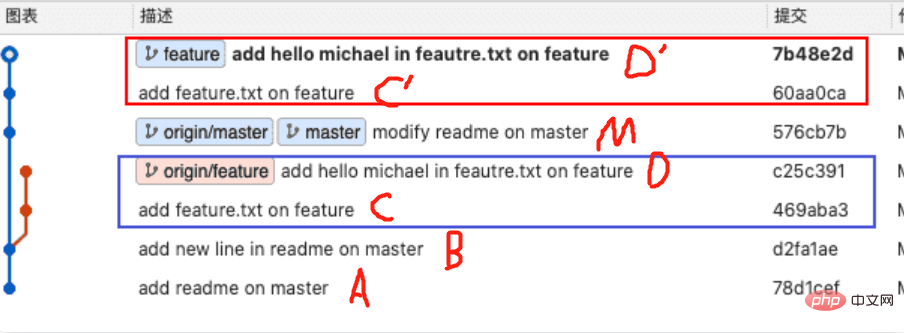What does git rebase mean?
git rebase means: redefining the repository status of the branch; when performing the rebase operation, git will extract the modifications on the branch to be rebased from the common ancestor of the two branches, and then rebase the branch to be rebased. The branch points to the latest commit of the base branch, and finally the changes just extracted are applied to the back of the latest commit of the base branch.

The operating environment of this tutorial: Windows 7 system, Git version 2.30.0, Dell G3 computer.
git rebase, as the name suggests, is to redefine (re) the starting point (base), that is, to redefine the repository status of the branch.
1. Submission node diagram
First, let’s feel what rebase is doing through a simple submission node diagram
Two branches, master and feature, where feature is at submission point B The branch pulled from master
has a new commit M on master, and two new commits C and D on feature

At this time, switch to the feature branch. Executing the following command is equivalent to merging the master branch into the feature branch
git checkout feature git rebase master //这两条命令等价于git rebase master feature
The following picture is the commit node diagram after rebasing. Explain its working principle:

- feature: base branch to be changed, current branch
- master: base branch, target branch
Official explanation: When performing a rebase operation, git will start from The common ancestor of the two branches begins to extract the modifications on the branch to be rebased, then points the branch to be rebased to the latest commit of the base branch, and finally applies the modifications just extracted to the back of the latest commit of the base branch.
Explanation with examples: When executing git rebase master on the feature branch, git will extract the modifications on the feature branch starting from the common ancestor B of master and featuer, that is, the two commits C and D, extract first arrive. Then point the feature branch to the latest commit of the master branch, which is M. Finally, the extracted C and D are connected to M, but this process is to delete the original C and D and generate new C’ and D’. Their submission content is the same, but the commit id is different. Naturally, feature eventually points to D’.
Popular explanation (important!) : rebase, rebase, can be directly understood as changing the base. The feature branch is a branch pulled from B of the master branch, and the base of feature is B. And if master has a new commit after B, it is equivalent to using the new commit on master as the new base of the feature branch. The actual operation is to save the submissions of the feature after B, then delete the original submissions, then find the latest submission location of the master, and then connect the saved submissions (new node with new commit id), so that the base of the feature branch is quite Yu became M instead of the original B.
There is also a very straightforward explanation. The key to the rebase command is actually to understand the "base". git rebase
2. Actual git submission example
The submission record is constructed according to the above diagram, as shown in the following figure: (ABM is the master branch line, and ABCD is the feature branch line. Here, the master changes color and branches out. This does not affect understanding. It means two Just two lines per branch!)

At this time, execute git rebase master on the feature branch
After the rebase is completed, ABCD is the original feature branch line , ABMC'D' is the new feature branch line, ABM is the master branch line (no change)

3. Recommended usage scenarios
There are so many things to do, but this is actually the most important thing. Different companies and situations have different usage scenarios, but in most cases the recommendations are as follows:
Use rebase when pulling the latest code from the public branch, that is, git pull -r or git pull -- Rebase, but one disadvantage is that after rebase, I don’t know which branch my current branch was first pulled from, because the base has changed. (If you use merge, there will be a meaningless commit record "Merge... to...")
When merging code on a public branch, use merge. (If you use rebase, then if other developers want to see the history of the main branch, it will not be the original history. The history has been tampered with by you)
Recommended study: "Git Tutorial》
The above is the detailed content of What does git rebase mean?. For more information, please follow other related articles on the PHP Chinese website!

Hot AI Tools

Undresser.AI Undress
AI-powered app for creating realistic nude photos

AI Clothes Remover
Online AI tool for removing clothes from photos.

Undress AI Tool
Undress images for free

Clothoff.io
AI clothes remover

AI Hentai Generator
Generate AI Hentai for free.

Hot Article

Hot Tools

Notepad++7.3.1
Easy-to-use and free code editor

SublimeText3 Chinese version
Chinese version, very easy to use

Zend Studio 13.0.1
Powerful PHP integrated development environment

Dreamweaver CS6
Visual web development tools

SublimeText3 Mac version
God-level code editing software (SublimeText3)

Hot Topics
 1386
1386
 52
52
 Git vs. GitHub: Version Control and Code Hosting
Apr 11, 2025 am 11:33 AM
Git vs. GitHub: Version Control and Code Hosting
Apr 11, 2025 am 11:33 AM
Git is a version control system, and GitHub is a Git-based code hosting platform. Git is used to manage code versions and supports local operations; GitHub provides online collaboration tools such as Issue tracking and PullRequest.
 Is Git the same as GitHub?
Apr 08, 2025 am 12:13 AM
Is Git the same as GitHub?
Apr 08, 2025 am 12:13 AM
Git and GitHub are not the same thing. Git is a version control system, and GitHub is a Git-based code hosting platform. Git is used to manage code versions, and GitHub provides an online collaboration environment.
 Is GitHub difficult to learn?
Apr 02, 2025 pm 02:45 PM
Is GitHub difficult to learn?
Apr 02, 2025 pm 02:45 PM
GitHub is not difficult to learn. 1) Master the basic knowledge: GitHub is a Git-based version control system that helps track code changes and collaborative development. 2) Understand core functions: Version control records each submission, supporting local work and remote synchronization. 3) Learn how to use: from creating a repository to push commits, to using branches and pull requests. 4) Solve common problems: such as merge conflicts and forgetting to add files. 5) Optimization practice: Use meaningful submission messages, clean up branches, and manage tasks using the project board. Through practice and community communication, GitHub’s learning curve is not steep.
 Should I put Git or GitHub on my resume?
Apr 04, 2025 am 12:04 AM
Should I put Git or GitHub on my resume?
Apr 04, 2025 am 12:04 AM
On your resume, you should choose to write Git or GitHub based on your position requirements and personal experience. 1. If the position requires Git skills, highlight Git. 2. If the position values community participation, show GitHub. 3. Make sure to describe the usage experience and project cases in detail and end with a complete sentence.
 Does Microsoft own Git or GitHub?
Apr 05, 2025 am 12:20 AM
Does Microsoft own Git or GitHub?
Apr 05, 2025 am 12:20 AM
Microsoft does not own Git, but owns GitHub. 1.Git is a distributed version control system created by Linus Torvaz in 2005. 2. GitHub is an online code hosting platform based on Git. It was founded in 2008 and acquired by Microsoft in 2018.
 Should I start with Git or GitHub?
Apr 06, 2025 am 12:09 AM
Should I start with Git or GitHub?
Apr 06, 2025 am 12:09 AM
Starting from Git is more suitable for a deep understanding of version control principles, and starting from GitHub is more suitable for focusing on collaboration and code hosting. 1.Git is a distributed version control system that helps manage code version history. 2. GitHub is an online platform based on Git, providing code hosting and collaboration capabilities.
 How to use GitHub for HTML?
Apr 07, 2025 am 12:13 AM
How to use GitHub for HTML?
Apr 07, 2025 am 12:13 AM
The reason for using GitHub to manage HTML projects is that it provides a platform for version control, collaborative development and presentation of works. The specific steps include: 1. Create and initialize the Git repository, 2. Add and submit HTML files, 3. Push to GitHub, 4. Use GitHubPages to deploy web pages, 5. Use GitHubActions to automate building and deployment. In addition, GitHub also supports code review, Issue and PullRequest features to help optimize and collaborate on HTML projects.
 What is Git in simple words?
Apr 09, 2025 am 12:12 AM
What is Git in simple words?
Apr 09, 2025 am 12:12 AM
Git is an open source distributed version control system that helps developers track file changes, work together and manage code versions. Its core functions include: 1) record code modifications, 2) fallback to previous versions, 3) collaborative development, and 4) create and manage branches for parallel development.




